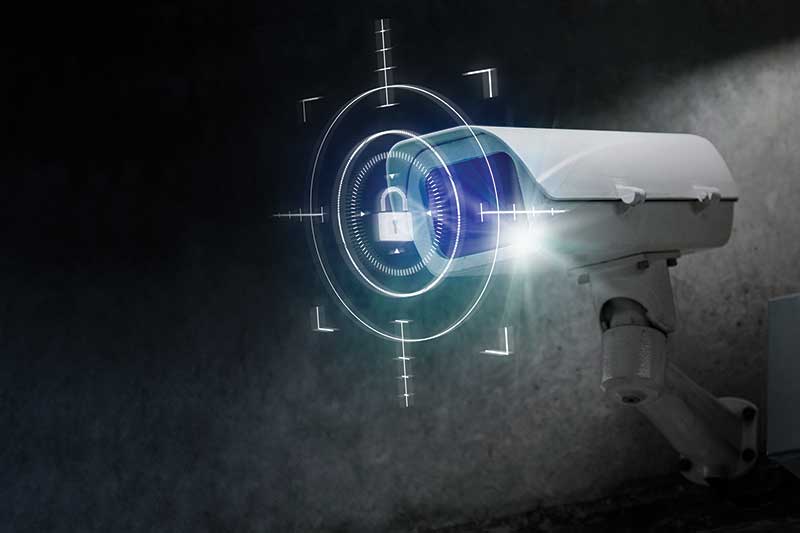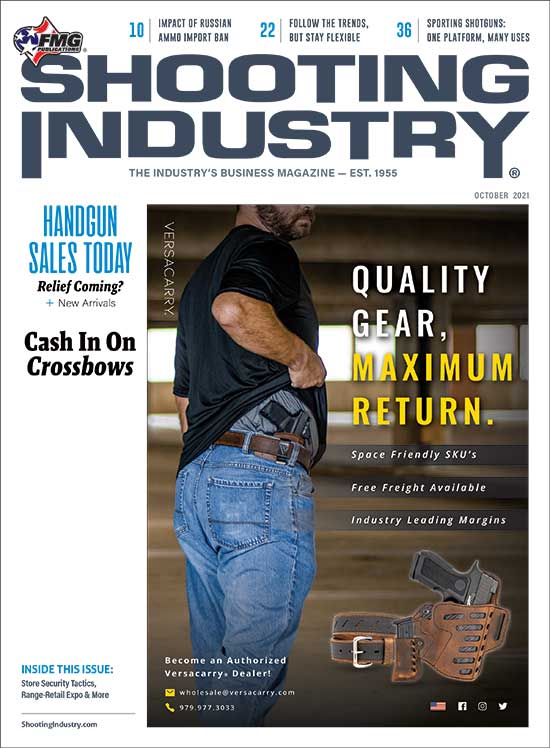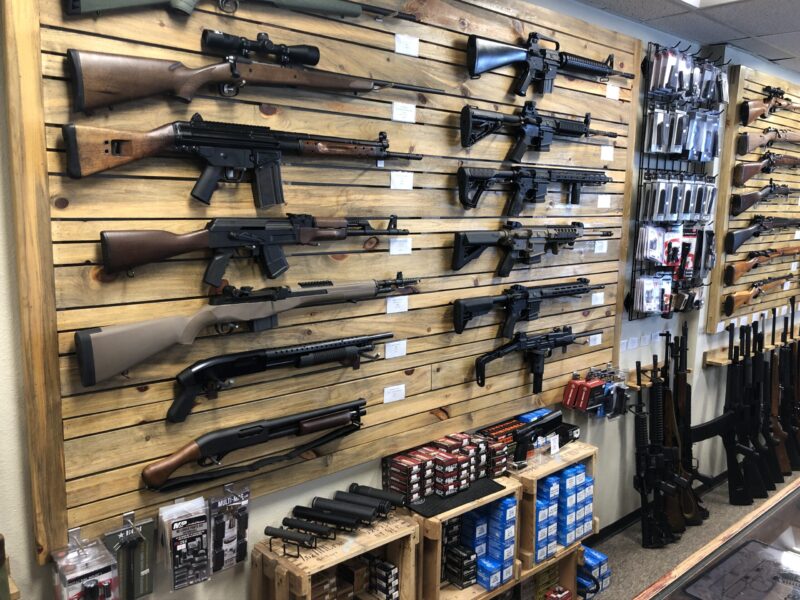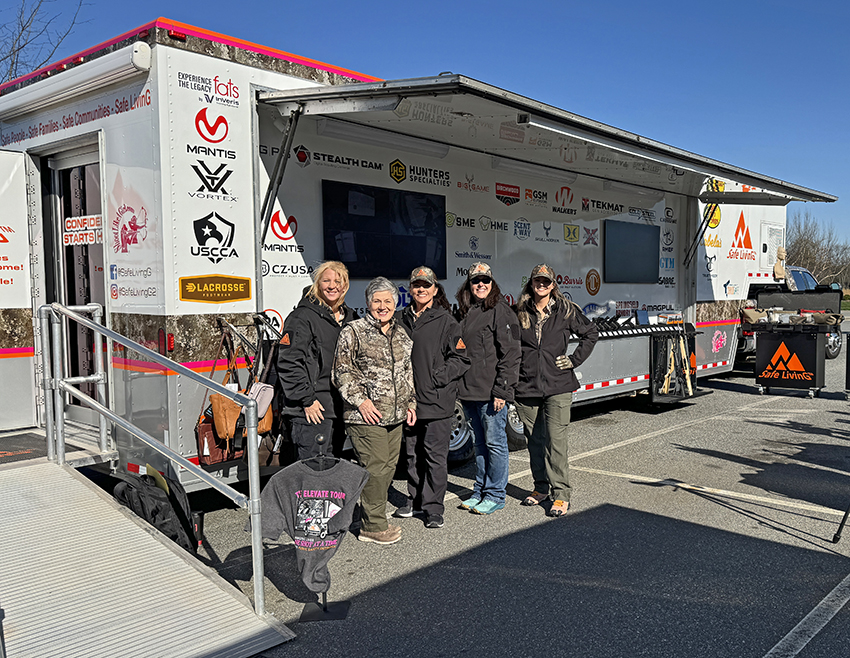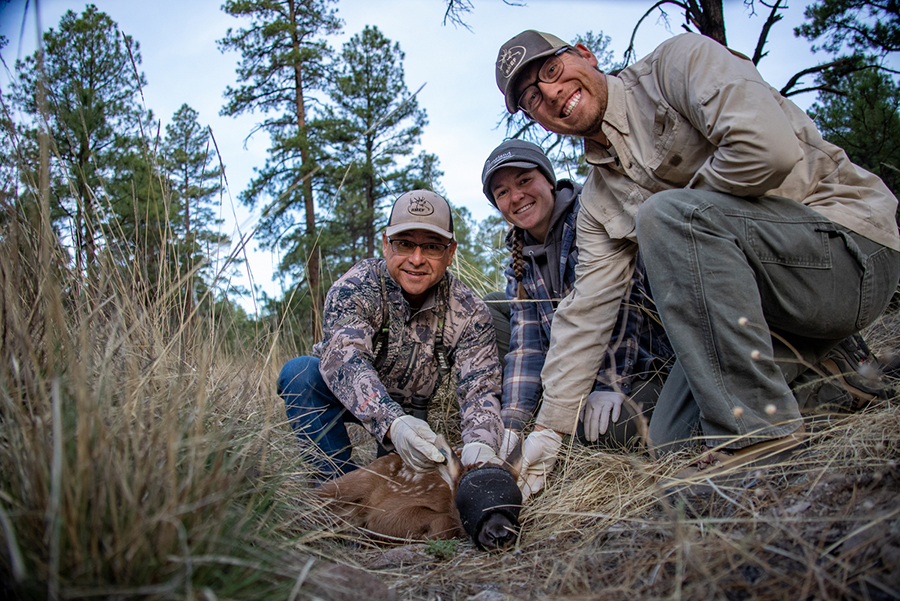Store Security Tactics
Tips For Protecting
Your Facility From Loss
It’s no secret business has been booming across the shooting sports industry. Lingering uncertainty about the future is continuing to drive sales of firearms and ammunition today. Unfortunately, last year’s events seemed to have triggered another nationwide trend — a sharp increase in the number of firearms stolen from FFL dealers.
According to the ATF, 6,269 guns were stolen from FFL dealers through burglaries and robberies in 2020. Burglaries of FFL dealers increased 43% from 2019 to 2020. Interestingly, FFL robberies actually decreased by 15% last year, likely a result of government-mandated lockdowns that slowed in-store traffic and forced gun stores and shooting ranges to temporarily shutter operations in many areas. However, the industry witnessed a 53% increase in firearms stolen during those robberies.
To better understand how FFL dealers are working to secure their facilities these days, we spoke with Jeff Poet, president of Jay’s Sporting Goods in Clare, Mich.; James Babiasz, president and owner of The Range of Richfield in Richfield, Wis.; and Bob Porter, general manager of Oasis Outback in Uvalde, Texas. Miles Hall, industry consultant with Hall-N-Hall consulting, also provided his thoughts on how to take a balanced approach to store security.
Confronting The Threat
How often would you estimate your facility faces the threat of theft?
Porter: Daily!
Poet: Every day. When you include shoplifting, it’s every day. There’s always a threat. You like to think it’s not happening with that type of frequency, but you almost have to have the mindset it is because you just don’t know.
Babiasz: We’ve been very fortunate. We opened seven years ago and we have had only one incident where local law enforcement had credible reports a group/gang was going to target all the gun stores in our area. The threat never materialized, but we took precautions internally and law enforcement posted a squad at our site just in case.
What is the most common type of theft you experience?
Babiasz: I would have to say shoplifting, but again it has been very minimal.
Poet: There’s no question it’s shoplifting for us. We’re in northern Michigan, so we’re not in an urban or suburban setting. We’re rural. Not that break-ins and robberies wouldn’t be a threat, but definitely our main problem by far — and the most costly — is shoplifting.
Porter: Shoplifting.
How important is having a theft prevention program?
Babiasz: & Porter: Very important.
Poet: You just have to have something in place that addresses theft. If you don’t, you leave yourself wide open. It’s always better to have prevention in place instead of chasing something that’s already happened. Once it has happened, you’re behind the eight ball and you’re not going to fare well any way you add it up. It’s better to put preventative steps in place.
Do you regularly assess your store’s security? Do you run tests, partner with a security company, etc.?
Babiasz: We discuss security with team members on an ongoing basis. Everyone knows to keep an eye on guests as they wander the store. Occasionally, we have a false alarm and it gives us a chance to discuss the situation with the monitoring company and law enforcement.
Poet: We’ve got it on a checklist. Every six months we’re testing doors. We have a central system, which means if we set the alarm and it goes off, it calls externally to a monitoring company. We’ll arm it and we’ll test all the exterior doors, and we’ll also tech test. They’ll report back, “I’m seeing the motion trip here and one trip there, and I’ve got this door or that door open,” just to make sure it’s reporting correctly. That’s a big one. It’s always good to make sure. You might find a zone that’s not reporting, and if it’s a key zone you definitely need to get it back online.
Hardening The Target
What are the best security investments a gun store or shooting range can make to prevent loss? What security measures are a must?
Babiasz: A good camera system. We have 24 cameras inside and out that are accessible by cell phone and computer. This way we can monitor all of the activity inside and outside the store. Also, we have an alarm monitoring company that monitors doors, glass breakage and any movement in the store after hours. We have bulletproof glass on all exterior windows along with concrete bollards at the front doors and exit security bars on all exterior doors. We have also installed a steel security gate at the overhead door, and don’t forget about exterior lighting focusing on entrances and parking areas. I believe all of these items are good, but a great relationship with local law enforcement is key.
Poet: The first one is building security. You’ve got to have a hard wire and, hopefully, you’ve got some motions. We’re big enough if someone does break in the exterior of the building, an alert goes to a central station and they notify the police. Our main problem is shoplifting, so training employees is next. Our theory is we have a gut instinct. What is that customer doing that just isn’t normal? What doesn’t seem right to you? Don’t ignore it. Try to see and understand why you don’t feel good about this. Then escalate it pretty quickly to a manager. Prevention is the best thing. If they steal and walk out the door, now you’re trying to chase them off the camera system. You’re behind the eight ball, and it always costs you more. If customers are shoplifting, they don’t like to be recognized. Greet everybody who is in your department. Make sure you make eye contact. Not only is it good customer service, but it also deters those who come in with the mindset they’re going to steal from you.
Porter: Electronic door and window sensors, interior and exterior video surveillance with minimum 14-day recording backup. Physical barriers at the front and back entrances to prevent “smash and grab” are also important.
Babiasz: Exterior lighting on sensors that automatically light up the building, entrances and surrounding areas from dusk until dawn.
“It’s always better to have prevention in place instead of chasing something that’s already happened. Once it has happened, you’re behind the eight ball.”
Jeff Poet, President Jay’s Sporting Goods, Clare, Mich.
What advice would you share with firearms dealers and range operators who want to upgrade their monitoring and alarm systems?
Porter: Monitoring systems can be labor/staff intensive. Obviously, alarm systems are only as good as the company that operates it. Do some research and get references from other businesses in the area.
Babiasz: Shop around. Find out how long they have been in business and get referrals. You do not want to skimp in this area. It is also a good idea to talk with your local law enforcement agencies. If you can, have them visit your site and give you recommendations and comments on what they would suggest to keep everything safe.
Poet: We just went through an upgrade here at our store. You can kind of get in a mode where it’s on autopilot and you don’t think about it. You set it and you go. You have to periodically step back and ask is everything being covered? Did you move stuff in the store where you need to add a monitor or a motion sensor?
Getting Employees Involved
How much time and effort do you put into training employees to recognize and prevent shoplifting?
Porter: Not as much as we should, for sure. Our management staff does occasionally remind employees of red flags to watch for.
Poet: Probably not enough time. We spend more time with the managers, because most of the time it gets escalated really quickly. How to approach and apprehend someone who’s shoplifting, unfortunately, comes up often enough we don’t schedule a store security drill. It comes up when we have an incident. We go over it again, and we talk about it. Unfortunately, it’s fairly frequent, so we are talking about it a fair amount.
Babiasz: Given the size of our store, the ability to have clear sight lines and ongoing conversations with team members works for us.
On the flip side, how common is theft by employees? How can FFL dealers and range operators prevent employee theft?
Babiasz: Hire good, like-minded team members and make sure they embrace the same core values you have. We also do occasional inventories on specific products to keep track of merchandise.
Porter: Not common at all. Prevention starts with the hiring process. Get to know new employees during the probationary period — that’s what it’s for. We have very little turnover, so I don’t think it’s really an issue.
Poet: Over the course of time, we’ve had incidences where there is no question it’s happening. My advice is just put procedures in that are standard so you have checks and balances. It’s not picking on anybody, but everybody has to do it. For example, a lot of our guys like to bring in their guns. We have a system where they check them in. We write down what they’re bringing in because it could come in without a riflescope and it could go out with a stolen riflescope, and you would never know. They have to check out through the same system. The other thing is you have to tell employees if you see something that just doesn’t look right, move it up the food chain. One of our most common ones is the dumpster trick. They take out empty boxes, but there’s three of them that have stuff in them. Then they do a drive-by at 10:30 p.m., 11:00 p.m. and retrieve the stolen items out of the dumpster. That’s a tough one. We have exterior cameras and one of the places we focus them on is our dumpsters. You also find stuff through inventories. If you keep coming up short on your inventories, there’s your red flag.
Are there any affordable security upgrades you would recommend?
Porter: Not specifically, although wireless game cameras can be a big help in some situations. We have our own video surveillance system and an IT staff to run it. We use a local security company for door and window sensors, etc., also for fire.
Poet: Training your folks. It’s the most economical piece of the puzzle. From the technology side, tracking your sales and knowing who customers are, which most POS systems do. Employee training is the least expensive. It’s just time and the study you put into it. And know your state laws. We’re in Michigan, and if they show attempt to steal, like if they were putting something into their purse or inside their coat sleeve or whatever, it’s enough to pursue. We can have intent inside the store, even just changing stickers. That’s shoplifting in another form — taking a price sticker and putting it on another item and getting that item for a fraction of the cost. We have it happen on a regular basis. We train our cashiers to pay attention to what the stickers scan. We catch a lot of it this way.
Cyber Security Threats?
Is cyber security a growing concern for FFL dealers? Any tips you can offer for protecting a store’s computer information systems, POS data, membership data, etc.?
Poet: It goes beyond e-commerce. Even if you’re not doing e-commerce, you still have a lot of valuable electronic data. You’re trying to protect that data, whether you’re running credit cards online with e-commerce or if you just have lists of people. We’ve spent a lot to make sure it can’t be hacked. It gets costly, but it’s hard to do business without having technology to help you along. You just have to guard that technology.
Babiasz: A great IT company, cloud backup, fire walls and limiting team member access to various websites, along with back doors to all of your systems.
Porter: If an FFL dealer does ANYTHING online … there is a risk. The only tip I have to offer is to get some sort of protection — the best you can afford. It’s only going to get more common and more sophisticated. Periodic updates should not be overlooked.
Editor’s Note: In the online version of this story, the dealers on this panel share tips on incorporating a crisis response plan.
For more, visit shootingindustry.com.
ONLINE BONUS
How critical is having a crisis response plan?
Poet: It’s very important to know what you’re going to do. It’s much easier to think it out prior than to act in the moment. You can’t plan for everything, but in generalities. You need to know when there is a crisis going on, here’s what you need to do. We do additional training being that we have a lot of concealed carry. It’s a line of defense as well, so you can protect those that are trying to flee to a place that’s safe.
Babiasz: It’s very important to have a plan so everyone knows what to do and what not to do in case of a crisis. The plan should be reviewed on a regular basis and upgraded as necessary.
Porter: Primary crises like fire, robbery and medical emergency events are gone over with new employees. Fire extinguisher locations, robbery alarm buttons and medical kits are made known to all employees.
A Balanced Approach To Security
A comprehensive security program requires much more than an alarm system and a few cameras sprinkled around your facility. It involves a balanced approach that protects your business and staff while ensuring law-abiding customers feel safe and welcome. Miles Hall, senior advisor at the business consulting group Hall-N-Hall, has observed numerous theft prevention hits and misses over the years.
How important is it for gun stores and shooting ranges to invest in a theft prevention program?
Hall: Security is a foundational part of the business. It’s both protecting your assets and serving as a good steward of your property in the community and the shooting sports as a whole. The dollars and cents of this is one part to be sure, but the PR of a burglary or a theft, internal or external, or an outright robbery will echo long after the deed is done and cleaned up. Your business will potentially be labeled and branded as irresponsible. This is a side most businesses never think of, and it is not a stretch to say it could be the end of it in a short time.
What are some of the biggest mistakes you’ve witnessed gun stores and ranges make when implementing security measures?
Hall: 1. Minimizing or not thinking about the potential of loss in the first place.
2. Thinking of external weaknesses only. Missing the biggest thieves who are right under the owner or manager’s nose.
3. No processes to regularly check inventory.
4. Poor, enabling or grossly inadequate managers.
5. No ongoing training of team and team leadership.
6. Going too far with measures that they lose the welcoming spirit and become suspicious of everyone.
7. Not seeking out professional help and guidance.
8. Being too overwhelmed with the idea and process of a full, in-depth inventory.
Can store and range staff take security protocols too far when interacting with guests?
Hall: Yes. There is a balance to find between securing and serving the legitimate needs of the guests who have elected to come to buy, NOT steal anything.
How can they secure their facility without offending guests?
Hall: Giving guests superb and attentive service. This sends a signal the floor is always in the eyes of the team members and, therefore, it’s harder to pocket items. I was able to interview convicted thieves years back and one of the things they shared was they want to be left alone so it makes it easier. They have left stores where too much attention was put on them.
What advice would you offer firearm dealers and range operators for successfully securing their operations?
Hall: Learn all you can about the issue. Talk with other dealers and range owners whenever possible. Seek out professional advisors who have a wide base of experiences and history. One man I have deep respect for is Bill Napier. NSSF has rightly been using his talents to help the front-line retailers for years now. Please feel free to email him at lpcbill@gmail.com. Depending on your level of membership in NSSF, there may be a savings for his services. Lastly, stay in the loop with fellow dealers, local law enforcement and the chamber of commerce, as they all will gladly help you.

